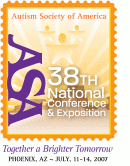 |
The ASA's 38th National Conference on Autism Spectrum Disorders (July 11-14, 2007) of ASAThe Westin Kierland Resort & Spa, Scottsdale, AZ |
| For a complete author index with session numbers, please click here | |
| Thursday, July 12, 2007: 3:00 PM-4:15 PM | |||
| Kirkland | |||
| #3004- Campaign on Developmental Milestones and Autism: CDC’s Learn the Signs. Act Early.* | |||
| A campaign to increase awareness and action in identifying children at risk for autism and other developmental disorders.
Research shows that children with developmental delays benefit considerably from early intervention services, yet half of these children are not identified until age 5. This session provides attendees with an overview and update of the CDC’s autism awareness campaign, and identifies further opportunities for parents, physicians, and child care providers regarding tracking of developmental milestones and warning signs of developmental delays, such as autism.
| |||
| Presenters: | - Jana Leigh Thomas is a vice president within Porter Novelli’s Health Care practice. She works with the National Center on Birth Defects and Developmental Disabilities, at the Centers for Disease Control and Prevention, on the “Learn the Signs. Act Early.” campaign. This comprehensive campaign draws on her 13 years of experience in health care promotion, consumer and provider education, governmental affairs, and media relations. Additionally, she works with the Healthcare Georgia Foundation, DS Waters and Boehringer Ingelheim in research, media relations, and message development. Jana holds a Master’s degree in Public Administration and Policy from Florida State University.
- Jenifer Kopfman, Ph.D., is a Health Education Specialist in the National Center on Birth Defects and Developmental Disabilities at the Centers for Disease Control and Prevention. With a Ph.D. in Communication (Michigan State University, 1995), her expertise in health communication blends persuasive health campaigns with interpersonal communication. She works as part of a multi-disciplinary team to promote and evaluate the “Learn the Signs. Act Early.” campaign, which encourages awareness of children’s developmental milestones and signs of developmental delays such as autism. | ||
|
| |||
|
In 2004, CDC launched the “Learn the Signs. Act Early.” campaign to educate parents, health care professionals, and child care providers about social, emotional, cognitive, and language developmental milestones and the importance of early intervention when a delay is suspected. Audience research found that parents want to know what to watch for and how to talk with their child's doctors. Health care professionals know developmental milestones, but expressed concerns about overly worried parents. Child care providers indicated they are many times uncertain of how to approach parents if they suspect a delay. This campaign creates and disseminates tools to increase the quality and effectiveness of dialogue between parents and health care professionals and parents and child care providers on childhood development. Partnering with national autism organizations, including the Autism Society of America and others, the campaign has embarked upon significant outreach efforts including mobilizing hundreds of parents and champions across the country to help spread campaign messages into local communities. These advocates distribute campaign materials and engage in local speaking opportunities and events in an effort to educate health care professionals, child care providers, and other parents in their communities about the importance of monitoring a child's development. Other significant outreach efforts include creating a dedicated campaign website with interactive tools for parents, downloadable materials, and other helpful resources; securing targeted news media placements; and attending health care professional conferences for numerous medical professional organizations. To aid in spreading campaign messages, a variety of tools and resources have been developed for parents, health care professionals, and child care providers. The resource kits for parents include fact sheets, interactive checklists, and information cards with questions to ask their child's doctor. Health Care Professional Resource Kits include these same materials and posters, office display stands, and resources to answer condition-specific concerns. Child Care Provider Resource Kits contain campaign flyers along with a CD with fact sheets about developmental milestones and developmental delays, a list of resources, tips on talking with parents about child development, and a developmental milestones checklist template. All these tools are designed to help parents learn about childhood development and they are important resources in their outreach efforts. The campaign also partners with Autism Speaks and the Ad Council on community messaging. Campaign impact and awareness results have proven to be significant thanks to efforts of parents and champions across the country. Evaluation data from the 2006 national HealthStyles survey revealed parents who are aware of the campaign are significantly more likely to believe the best time to get help for a child with autism is before 2 years old (30% of those aware vs. 24% unaware). Similarly, significantly more parents aware of the campaign strongly agree or agree that their child's nurse/doctor asked about their child's development at their last well-child visit (81% of those aware vs. 76% unaware); and aware parents were significantly more likely to strongly agree or agree that they asked their child's nurse/doctor for more information about their child's development (59% of those aware vs. 47% unaware). Data from the 2004 and 2006 DocStyles surveys indicate that more pediatricians regularly screen for developmental delays (from 87% in 2004 to 92% in 2006) and significantly fewer pediatricians advocate a “wait and see” approach when parents share a concern about their child's development (30% in 2004 vs. 14% in 2006). |
|||
See more of General Submissions
See more of The ASA's 38th National Conference on Autism Spectrum Disorders (July 11-14, 2007)